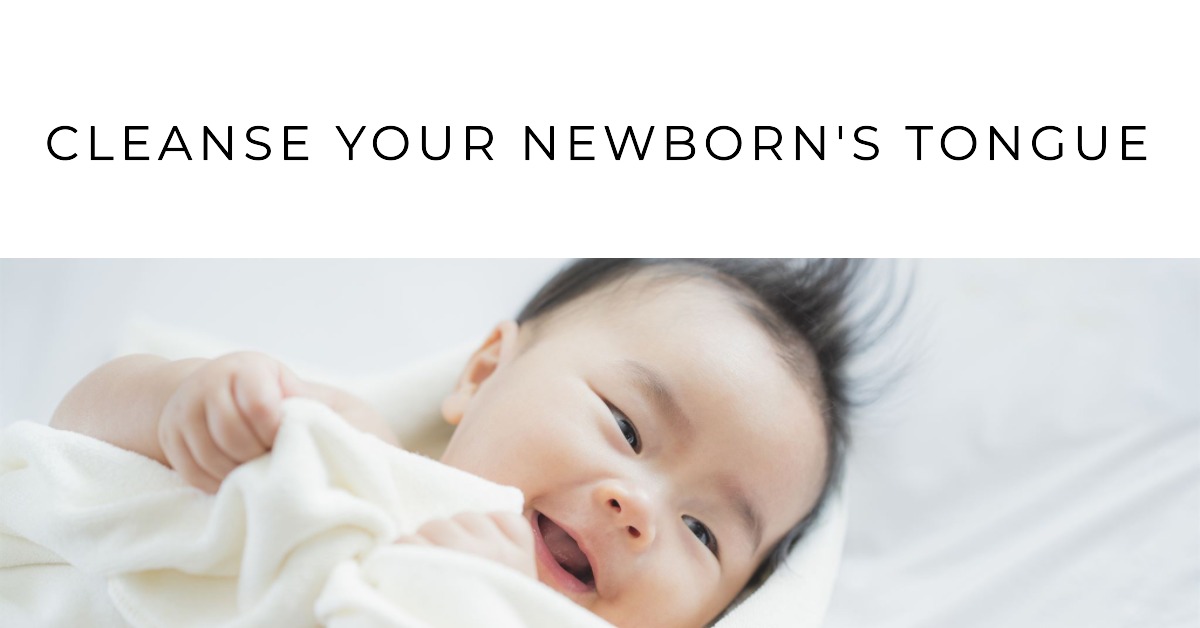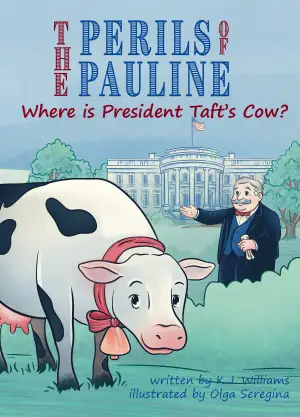Cleaning baby’s tongue is essential to keep a baby healthy and happy. But how to clean newborn baby’s tongue safely? there are a few essential steps to clean a baby’s tongue correctly.
Start by wrapping the infant in a towel and placing it on your lap. Then, use a moistened piece of gauze or cloth dipped in warm water. Gently wipe the front and back of the tongue from top to bottom. Be sure not to press too hard so as to avoid irritating the delicate tissue of the mouth. Later, rinse with another clean piece of gauze or cloth before patting it dry with another one.
In this guide, we will talk about how to clean newborn mouth and tongue, the exact time to clean baby’s tongue and more. If you are interested then stay reading.
Daily Tasks to Keep Your Baby Tongue Clean
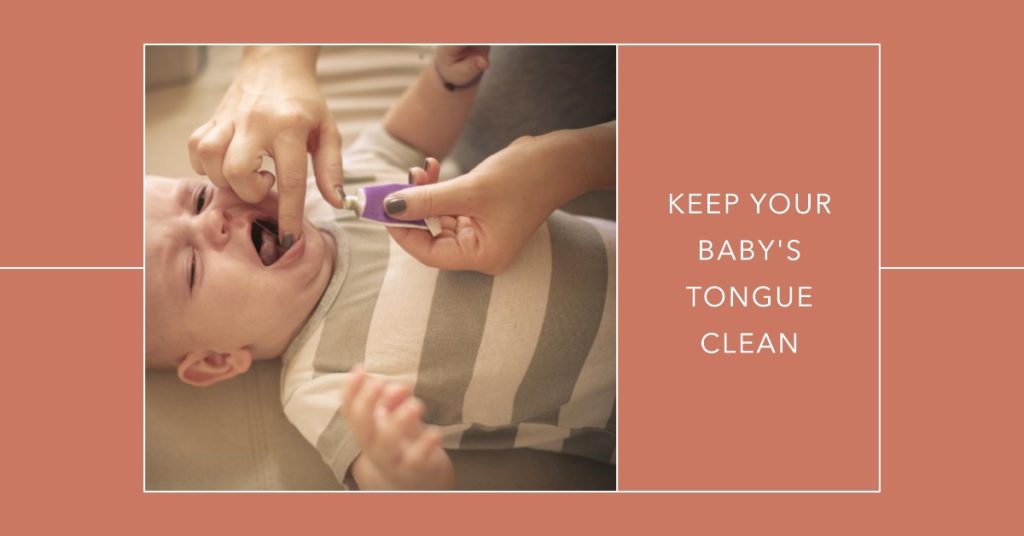
Keeping your baby’s tongue clean is an important aspect of their oral hygiene. Here are some daily tasks you can follow to ensure your baby’s tongue stays clean and healthy:
Gentle Wiping:
You can use a clean, damp cloth or a specialized baby tongue cleaner to gently wipe your baby’s tongue. Make sure the cloth is soft and not abrasive.
Choose the Right Time:
It’s often best to clean your baby’s tongue during or after their bath when they are already used to having their mouth and face touched.
Use Clean Water:
If you’re using a cloth, make sure it’s rinsed in clean water before you use it to clean your baby’s tongue.
Positioning:
Hold your baby securely in a comfortable position, such as cradled in your arms or on a changing table, with their head supported.
Gentle Movements:
Gently wipe the surface of your baby’s tongue with a cloth or tongue cleaner. Be careful not to apply too much pressure, as a baby’s tongue is delicate.
Be Mindful of the Gag Reflex:
Babies have a sensitive gag reflex, so avoid putting the cloth too far back in their mouth.
Rinse the Cloth:
If you’re using a cloth, rinse it frequently to remove any residue from your baby’s tongue.
Inspect for Residue:
After cleaning, inspect your baby’s tongue to make sure there are no leftover milk or food particles.
Establish a Routine:
Try to make tongue cleaning a regular part of your baby’s daily routine so they get used to it.
Observe for Changes:
Keep an eye out for any signs of oral issues, such as thrush (a type of oral yeast infection) or white patches on the tongue. If you notice anything unusual, consult your paediatrician.
Maintain Good Hygiene Habits:
As your baby grows, you can start introducing them to good oral hygiene habits. This includes using a soft toothbrush and a very small amount of fluoride toothpaste once their first teeth start to come in.
Remember, it’s crucial to be gentle and patient when cleaning your baby’s tongue. If you have any concerns or questions about your baby’s oral hygiene, don’t hesitate to consult your paediatrician or a healthcare professional for guidance.
Home Remedies to Clean Baby Tongue
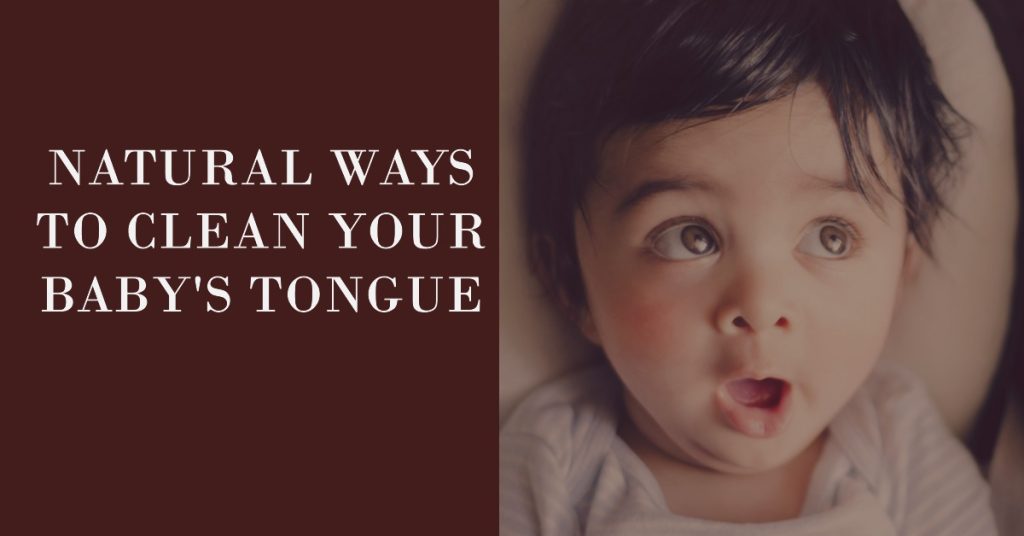
Are you concerned about how to clean a newborn baby’s tongue at home? Here are three simple home remedies to clean your baby’s tongue:
Breast Milk or Formula Solution:
- Express a small amount of breast milk or prepare a small amount of formula milk.
- Dip a clean, soft cloth or gauze pad into the milk.
- Gently wipe your baby’s tongue with the moistened cloth, being careful not to go too far back to trigger the gag reflex.
Warm Water and Gauze Pad:
- Wet a clean, soft gauze pad with warm water.
- Gently wipe your baby’s tongue with the dampened gauze pad, using light pressure.
- Inspect the tongue to ensure it’s clean and free of any residue.
Vegetable Glycerin Solution:
- Mix a small amount of vegetable glycerin with an equal amount of water.
- Dip a clean cloth or gauze pad into the solution.
- Use the damp cloth or gauze to gently clean your baby’s tongue, taking care not to go too deep into their mouth.
Remember to perform these steps with gentle and slow movements, and always ensure that whatever you use for cleaning is clean and safe for your baby. If you notice any unusual changes in your baby’s mouth or have concerns about their oral health, consult a paediatrician for further advice.
Know About Baby Tongue Cleaner Drops
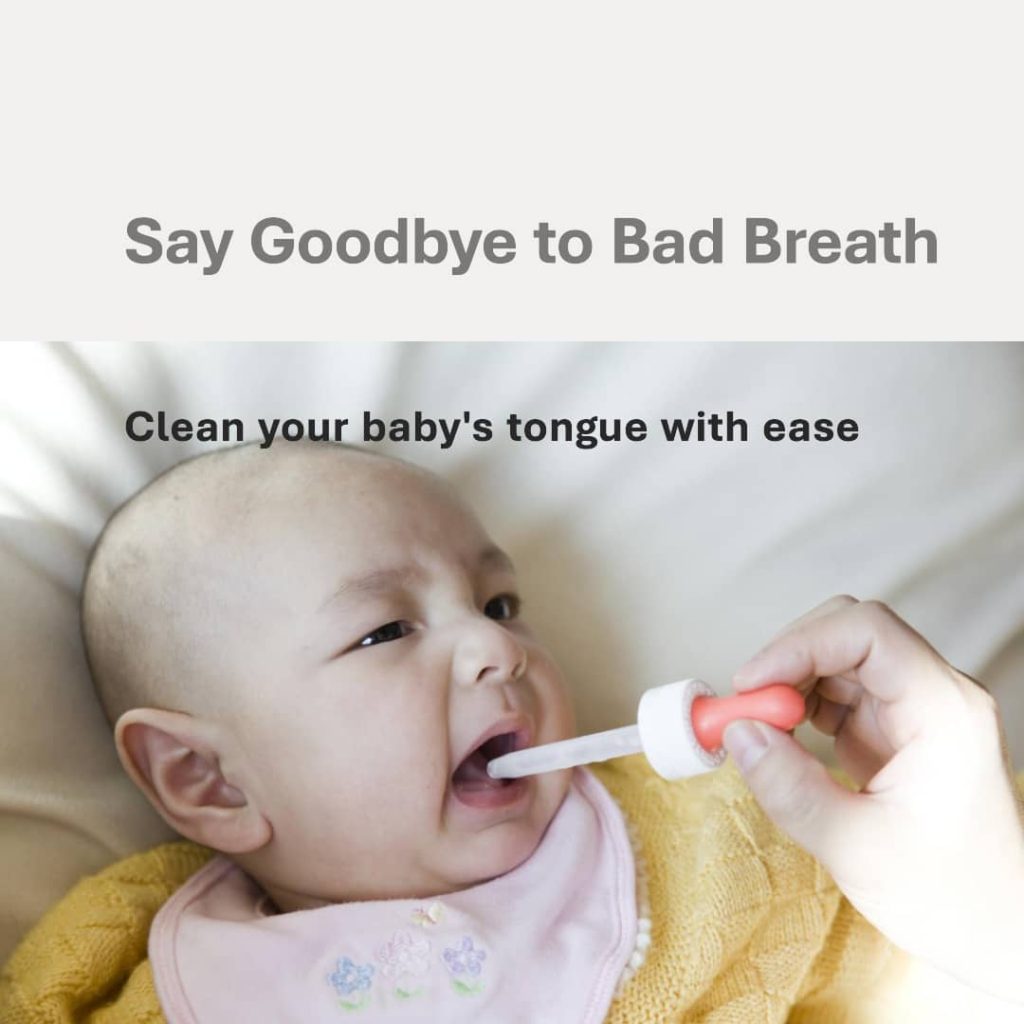
Baby tongue cleaner drops are specially formulated solutions designed to aid in cleaning a baby’s tongue. These drops typically contain safe and natural ingredients that help remove residue, milk film, and bacteria from the tongue’s surface. To use, a few drops are applied to a clean cloth or a specialized baby tongue cleaner. Gently wiping the tongue with this solution helps maintain oral hygiene and prevent potential issues like thrush or bad breath.
It’s crucial to ensure that the drops are specifically designed for infants and do not contain any harmful chemicals. Always consult with a paediatrician before introducing any new products to your baby’s oral care routine.
When Can I Start Cleaning My Baby’s Tongue?
Cleaning your baby’s tongue is an important part of their oral hygiene. But it’s essential to wait until they’re ready. Generally speaking, you can start cleaning your baby’s tongue when they reach 6 months old. Before then, their tongues were more delicate and sensitive and weren’t able to handle the pressure of a brush.
To clean your baby’s tongue at this age, you should use either a damp cloth or a gauze pad. These will soak in warm water and gently rubbed along the surface of the tongue from back to front. Be sure not to scrub too hard as this may irritate their delicate mouths. Once done, rinse off all residue with some cool water before drying off with a soft towel.
Is It Necessary to Clean Newborn Tongue?
When it comes to new parents, the question of whether or not they should clean their newborn’s tongue is often on their minds. The answer is yes — cleaning your infant’s tongue can help keep them healthy and prevent bacteria from building up in their mouth. Cleaning a newborn’s tongue may seem intimidating at first, but thankfully there are safe and gentle ways to do it.
Start by using a soft cloth saturated with warm water and gently wiping the baby’s tongue after every feeding. This will help remove any milk residue that could lead to bacterial growth or infection if left unchecked. It is also important to use separate cloths each time you wipe your baby’s mouth so you don’t spread germs between feedings.
Additionally, some doctors recommend using an additional solution such as boiled water or saltwater when cleaning a newborn’s tongue. However, check with your paediatrician before trying this method just in case there are specific instructions. The number of solutions should be used depending on the age of your child.
Finally, make sure the tools you use for cleaning are sterilized properly so that no bacteria gets transferred onto your baby’s delicate skin during the process!
How Do I Get the White Stuff off my baby’s Tongue?
If you’ve noticed that your baby has a white coating on their tongue, don’t worry. It is actually quite common. This is caused by the buildup of bacteria and food particles that can accumulate over time. Luckily, there are some easy steps to help get rid of this white stuff from your baby’s tongue.
The first step is to make sure you brush your baby’s teeth regularly with a soft-bristled toothbrush using toothpaste specifically designed for infants. Additionally, gently wiping down your baby’s mouth with a damp cloth or gauze may help remove any debris stuck on their tongue.
You can also use an infant tongue scraper if available – these devices are specially designed to safely scrape away bacteria and other residue without harming delicate tissue in the process.
Finally, make sure you’re feeding your little one healthy foods that contain beneficial nutrients like probiotics which may reduce bacterial buildup in their mouths and keep them healthy overall! Taking all these steps should help clean off the white stuff from your baby’s tongue quickly and easily!
Should I Clean My 2-week-old Tongue?
When it comes to cleaning your tongue, the answer is yes. Even though you may not think that a two-week-old tongue needs to be cleaned, it does in fact require some attention. Your mouth and tongue are constantly exposed to bacteria and plaque from food particles and drinks that enter your mouth regularly.
This can easily lead to bad breath and possibly even more serious infections if left untreated for too long. Additionally, tongues naturally have bumps on them called papillae which can harbor trapped food particles and bacteria as well making regular cleaning necessary. To clean your two-week-old tongue effectively, try using a special scraper or brush designed specifically for this purpose after meals or snacks.
Make sure you’re gentle when brushing since applying too much pressure could cause damage or irritation of the delicate tissue on the surface of your tongue. You should also rinse with water afterwards to get rid of any debris left behind by brushing before enjoying fresh breath all day long!
How to Clean Your Baby’s Tongue – Tips & Precautions
Conclusion
Overall, cleaning a newborn baby’s tongue can be a daunting and intimidating task for first-time parents. However, using proper techniques with the right tools can help to ensure that your little one is comfortable while keeping their mouth free of bacteria. With regular and consistent care, you’ll quickly get used to this new parenting routine as part of caring for your newest family member.

